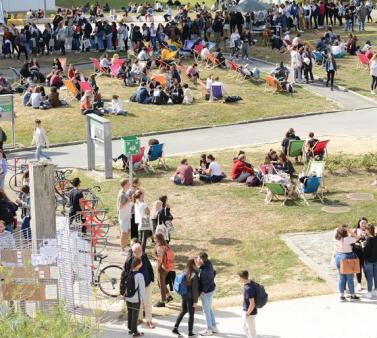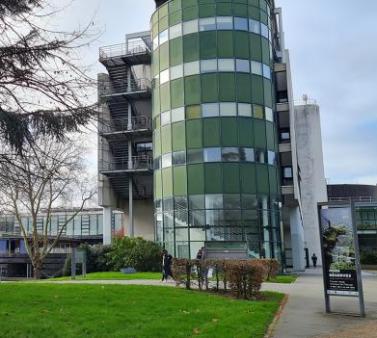Thank you both for speaking with us. Could you please provide us with a little context of this visit, how it came about and the work you’re undertaking together?
Başak Başoğlu (BB): Of course. I applied for the Scientific research stay scholarship (SSHN) via the French Embassy in Ankara, so that I might advance a report I’m co-authoring with Dr. Nilüfer Oral, Director of the Centre of International Law (CIL) at the National University of Singapore, on the topic of green finance and the protection of the environment. The report is for the International Academy of Comparative Law (IACL), a Paris-based academy which holds general conferences every four years on topics that will be important for the future, and green finance is one of the topics of the next congress taking place in October.

Thanks to the SSHN, a mechanism which provides funds for international postdoctoral researchers to be able to realize collaborative work in France with CNRS joint research units, I was able to come to France and work with the LiRIS research center and Catherine Malecki in particular. Part of the report preparation process includes comparing submissions that have been written by researchers in different countries around the world, and Catherine has helped by writing the French report for us. That's actually how we got connected, through this project.
Catherine Malecki (CM): Yes, I'm very happy to have met Başak. It's a great connection. We met through the IACL. You see, my current research work is about sustainability which echoes Basak's research work on green finance and the report she is preparing for the next Congress. Because July is a very quiet period here at the University, it has been a great moment for us to be able to focus and advance the work, which is also a topic that is linked to the second axis of the LiRIS research group: dealing with environmental and the climate crisis through sustainable finance. This challenge is becoming more and more important, particularly because of the imperatives of financing climate change.

Please tell us more about green finance vs. sustainable finance?
BB: Yes, green finance is part of sustainable finance. Sustainable finance is a more general term which also incorporates social and governance issues. But green finance only focuses on the environmental aspects of sustainable finance. So that's how we have the link with the laboratory and Catherine invited me to present my work at the Day of Research at Rennes 2, which was held on June 24th. And we hope to have future round tables and conferences together.
But overall green finance became a very important topic after the Paris Agreement in 2015. It marks the importance that finance needs to play in combating climate change. So there should be measures regarding transition of the economies but using finance as a tool. So since then, everything has been moving very fast because finance plays a key role in allocating the resources.
This is true, for example, with banks and financial institutions. Traditional finance will often only focus on profits. And since the Paris agreement, it is now acknowledged that finance should also consider the environmental aspects in regards to the climate crisis. If the banks continue to fund the fuel industry or the polluter industries, those industries will keep going and there won’t be a way to decrease pollution. So, we’re definitely making progress in recognizing this. But the problem now is that all around the world there is a lack of regulation in green finance. Green finance is encouraged by international agreements, but in national laws or in international regulations there is a lack of regulation. It's hard to define what is green and what is not. Some areas are very debated. For instance, some energy types are considered green for some people, but not for others.
What would be an example of a type of contested green energy?
BB: Actually, most of the energy types are very debated. Nuclear energy can be thought of as a very clean energy, but then if you consider the whole process such as mining, milling, construction and decommissioning and also the nuclear waste which has to be deposited, it becomes a problem. So some people consider nuclear energy as clean energy, but it also has a huge environmental impact as well. It's the same for many other energy types, like natural gas. Clearly, the fossil fuel industry is among the worst, but since there is no consistent definition of what is green and what is not, or there could be different shades of green. Even a green renewable energy, could have negative impacts for instance on land use if you consider it globally. So this should be elaborated and cemented in regulation. The European Union, since the Paris agreement, has been very fast in regulating green finance and now there is the European taxonomy, which is very important. There are plenty of taxonomies all around the world but the EU has a unified, harmonized taxonomy.
What are some of the other important issues surrounding green finance and taxonomy that need to be addressed?
BB: Transparency is another important issue that needs to be addressed. If we don't have transparency in this field, we won’t know if investments are really investing the funds to green fuels or not. So transparency will allow us to monitor the funds once they are given. So this is another big issue that will be important to taxonomy in the future. For example, if you see that funds that are invested in a certain investment or energy, and it turns out that it's not very good at protecting the environment, then you could actually change the future taxonomies or standards.
The European Union also has regulations on transparency issues, but, as I describe in my report, it’s also important to follow what's going on in every country and to see if there could be some consistency all around the world. The EU countries need to somehow secure that other countries who are engaged with the EU comply with the European standards as well. But climate change is a global problem, so it should also be considered internationally. This could be done through government policies or incentives.
And were these the issues discussed during the Rennes 2 Day of Research? Did it go well?
BB: Yes, at the conference, I presented some of the key elements from the report that I'm writing. It was a very fruitful day because it was interdisciplinary. So I met with different people from different backgrounds.
CM: Absolutely, it was very interesting. And it was a good opportunity for Basak to meet and discuss these issues with others in French research. Unfortunately, there were not many lawyers but it was still the opportunity to meet academics and others who are involved in the topics of sustainable finance, or green finance, or corporate social responsibility, generally speaking.
In my opinion, academic lawyers have to work together and publish on this topic, because, as Basak said, first of all, it's a question of regulation, it's a question of law, because if we do not have these, things wouldn’t change at all. So we need the insurance sector, the financial sector and many other industries. In France and in Europe, all these sectors have to be involved in a mandatory way in order to create change. And now, because of the Commission, things are moving very fast since there is regulation, and not only directives. But this work needs to be continued though the international, regional and national levels in Europe and outside of Europe.

Day of Research
Are you working on any other future collaborative projects in the same area?
CM: Well, right now Basak is focusing a lot on the October IACL Congress. But hopefully, yes we will have other moments to collaborate on projects together, be they workshops or other forums. I am currently also preparing a book on sustainable finance too, for students in French and hopefully in English. And in September, hopefully I will be organizing a workshop, which will likely be held online. Going forward, I would like to organize similarly informal types of workshops maybe twice a year, with researchers from places like the United States, England, the Netherlands, etc. It would be great to discuss all of these topics regularly through the prisms of civic and private or corporate law.





